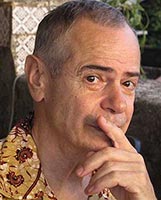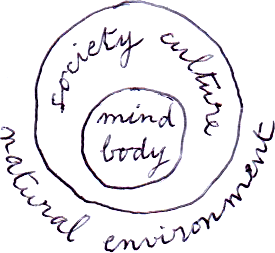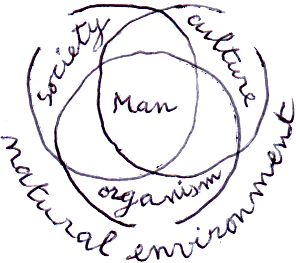Directeur de recherche émérite au Centre national de la recherche scientifique. |
 |
My research interests lie in the field of general anthropology. Given how excessively self-confident about its fundamental assumptions concerning humans and society Western thought still is, I call this thought into question, to enable me to propose more adequate representations based on recent scientific knowledge in biology and in the human sciences. I have presented partial results in that direction in previous books, and more fully developed ones in my most recent work: L’Homme, une espèce déboussolée. Anthropologie générale à l’âge de l’écologie (Fayard, 2018). Humans appear in it as hybrid beings, the result of a complex symbiosis of organism, social life, culture and natural environment.
The following figure represents the spontaneous conception of man, which is current in the West: humans are made of a body and a mind, which are closely entangled (or according to the dualist framework: of body and soul; and to the monist one: organism whose brain produces self-consciousness). The individual thus appears to be quite distinct from society. Likewise, culture is thought to be discontinuous with nature.

From this point of view, Homo sapiens is supposed to be human by nature. Individuals are supposed to have gathered together in order to establish society, and culture to have amounted to techniques allowing humans (or men) to benefit from the natural environment and to protect themselves from it. Since Antiquity, this utilitarian outlook has formed our common background, of which it is difficult to get rid.
However, we now know that social life, far from having been invented by humans, preceded their emergence by millions of years. Without social life, hominization would not have happened. We also know that human cultures are not only made of a set of utilitarian techniques. Language, kinship and a whole range of cultural realities indeed play a constitutive role in the becoming human of every newborn. The interactions that the infant’s surroundings establishes with him or her activates his or her brain, which develops and organises itself through being colonized by its cultural, social and natural environment. The following figure illustrates the modified outlook that I propose:

In so far as our experience of self-consciousness is clearly distinguished from the objective world, the body-mind distinction remains relevant to some extent. Yet, in so far as we have the feeling of living and of existing, we experience our mind as being in symbiosis with the body and its environment. Social life and culture both surround us and are within us (this is strikingly apparent as far as language is concerned, for language is a social and cultural fact, as well as an inner support of our mental activity).
Social life and culture do not only fulfil utilitarian and adaptive functions, they also constitute our subjective being, our interiority. The latter thus depends on our biotope, which is submitted to contingencies that provoke changing affects, ways of being, and states of lesser or greater being. Our cognitive activities occur within the framework of affects and ways of being, on which they depend, even though they have modes of functioning of their own.
Just as organic life, then, implies both metabolism and homeostasis, our psychic life also rests on metabolic (all manners of exchanges) and homeostatic activities (stabilization of the self), which respond to the desire and the need to exist that animates us. Scientific ecology does not therefore pertain solely to the future of our planet and its impact on our organism; it must thus also extend to our psychical existence.
In the former worldview, market economy was thought to be the foundation of human society; in the modified one, it loses this hegemonic place, because the frames of reference and the activities that sustain human psychical and social existence are seen as being no less fundamental. It is true that many of these activities and frames of reference endure by grafting themselves upon economic activity, which can work in their favour or go against them.
Human cultures give rise to diverse kinds of institutions as well as explicit and implicit norms, which inform relational practices and ways of being, and which are also altered by them. As we know, individual interests and desires do not readily let themselves be absorbed by the common good; moreover the compass or the “Third Party” which serves to justify norms and principles of action, itself precisely comes from human cultures themselves. Therefore, it depends on their biases and their rival powers. Unlike other animals, humans are thus exposed to the torments of normativity.
This is the basis of the project with which I will henceforth be concerned. Instead of holding on to a transcending source of morality, general anthropology invites us to look for its origins in the natural and social history of mankind. It is also a matter of understanding how, in accordance with the relational, social and cultural force fields constituting our biotope, our ways of being take shape, driving us to act for the good or for evil. We should downscale our flattering belief in free will (traditionally linked to the Western notion of the individual) and endorse an ecological approach to the human psyche. Such an exploration, a complementary pillar of humanism, is indispensable to human progress.
• Site du CRAL, EHESS
• François Flahault sur Wikipédia
• Le sentiment d’exister
• Le bien commun vécu
• Nos écosystèmes et nous
• Ce que les contes nous apprennent
• Le meilleur de nous même n'est pas forcément en nous
• La philosophie occidentale une affaire d’hommes
• Les débuts dans la vie